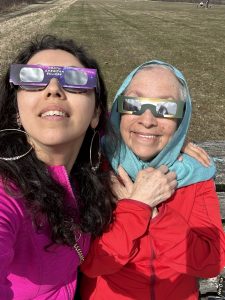

Following the 2023 and 2024 solar eclipses, Eclipse Soundscapes participants answered a number of survey questions that asked how the experience made them feel. Did the eclipse give them an experience of “awe” or a feeling of connection to something greater than themselves? Did participating in the project improve their feelings of belonging in science?
Researchers at North Carolina State University are using those participant responses to learn more about the emotions that eclipses evoke.
Kelly Lynn Mulvey, an Associate Professor of Psychology at North Carolina State University (NCSU), has spent her career studying how to increase participation in STEM. Mulvey worked through data from approximately 3,200 Eclipse Soundscapes Apprentices, Observers, and Data Collectors, uncovering some fascinating results.
An increase in science belonging
Overall, participating in the Eclipse Soundscapes project increased feelings of belonging in science. “We saw an increase in belonging from their reports of how they felt before they participated in the role and how they felt after they had participated,” Mulvey said.


Eclipse percentage and awe
Mulvey also studied how the eclipse impacted feelings of awe in participants. Her work built upon research surrounding the 2017 eclipse and the language used in Twitter (now X) posts. The earlier study indicated that the amount of eclipse coverage was related to increased awe. “People who were posting about the eclipse who were closer to totality used more words related to awe than those who were off the path of totality,” Mulvey said. For the Eclipse Soundscapes project, participants were specifically asked whether the eclipse increased feelings of awe. Again, the percentage of coverage proved important. “Those who experienced the total eclipse reported greater awe than those who experienced the partial eclipse,” Mulvey said.
Changes in animal behavior
Other teams at NCSU, led by Professor of Biological Sciences Adam Hartstone-Rose, are studying observations of animal behavior collected by Eclipse Soundscapes Observers. The teams hope to identify which groups of animals (birds, insects, mammals, etc.) changed or did not change their behavior during the eclipse. If animal groups did change their behavior, the team is trying to identify when, and how long it took them to return to “normal” behavior. “It’s laborious work, there is a lot of coding involved,” Mulvey said, but she expects to have some basic animal behavior findings soon. To learn more about the preliminary work done by Harstone-Rose using 2023 ES Observer data check out “Extraordinary Darkness: A Participatory Approach to Assessing Animal Behavior During Eclipses.“
Implications for future science
Mulvey’s research demonstrates the long-lasting scientific impact of the data from Eclipse Soundscapes participants. Not only does participatory science provide researchers with reliable and authentic data, it benefits the participants as well. “I think the belonging results especially are really important, because it suggests that doing these participatory science projects can help you feel like you fit in more with science,” Mulvey said. “I think it has the potential to really harness folks’ nascent interest in science and launch them into continuing to select either informal science activities, or maybe more formal science work, like pursuing a degree or a job in science. We have a lot of deficits in terms of who is entering STEM fields right now, and a need for more people and more people from (various) backgrounds…to leverage their skills and help us to answer the big scientific questions that are out there.”